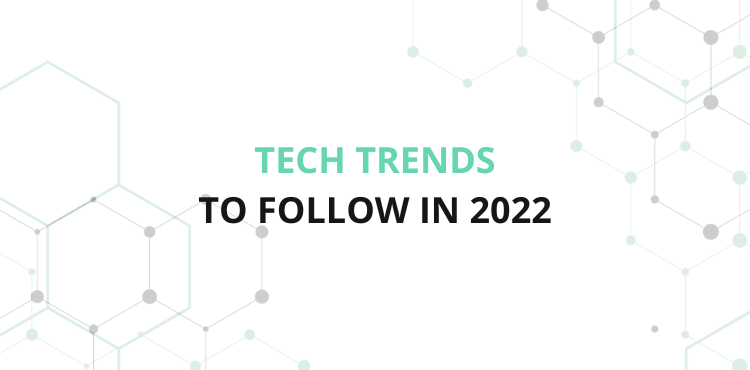Digital transformation has accelerated across every sector in the post-pandemic world. Staying on top of the latest tech advances is necessary for every business now including the automotive industry. With almost halfway into 2022, we bring you the essential tech trends to follow:
Metaverse and Blockchain Technology:
Virtual reality (VR) and augmented reality (AR) existed before but with Facebook rebranding itself to Meta, a buzz was created and the awareness of the metaverse caught on. Companies are investing more and more in metaverse – a next-gen social connectivity platform which is planned to be a “successor of the mobile internet”. You can now buy and own virtual assets and even trade them, eliminating the risk of fraudulence, thanks to NFTs (non-fungible tokens). According to an article on lbbonline.com, one of the leading automobile brands, Volkswagen stepped into the Metaverse with the world’s first NFT-embedded advertising campaign. Blockchain technology enables the non manipulable and transparent logging of the vehicles’ sensor data in a decentralised network. Therefore, blockchain technology actually helps to keep track of the details of the journey in a self-driving car.
Artificial Intelligence (AI) and Machine Learning:
From chatbots to self-driving cars, machines are learning human behaviour and the ‘intelligent’ factor lies with AI. Thanks to AI being one of the constantly evolving technologies, we are able to take advantage of analyzing real-time city traffic data and driver behaviour, built-in smart parking systems and smart parking. On another note, brands in the Volkswagen Group are already using Generative Design – a design system of combined augmented and virtual reality to create possible error-free and thoughtful design concepts for future automobile parts and models. These have helped in making cars more compact without losing the quality and a sense of space.
According to an article published by KPMG, more reliable mechanisms and AI-Ops are emerging in 2022, that can help organizations validate, test and create transparency, and allow you to use AI more securely. Yet another reason why the adoption of AI in many aspects of businesses is on a steady rise.
(AI-powered) Cybersecurity:
Cyberattacks these days have gone beyond phishing email scams and ransomware. Imagine hacking a smart car or banking institution and more. Just like the code and the tech, threats are evolving too. Businesses these days are quick to adopt new cybersecurity technologies, like AI and end-to-end encryption of online data, to keep a check on and secure networks against hackers in real-time rather than waiting for the damage to happen before responding. Automobile giants like Continental, Tesla and others plan and dedicate large budgets to update and have solid cyber security and functional safety system in place. In layman’s terms, automotive cybersecurity solutions consist of efficient embedded cryptography architectures based on AUTOSAR and other security requirements. These security measures are designed to secure communication, grant authenticated identification, protect from theft, detect anomalies and intrusion, and all other types of cryptographic calculations and secure diagnostics. At Futurepath, we take pride in working closely with CARIAD, a Volkswagen Group company, to find the right people who work with cyber resilient embedded systems.
Data Science:
By now it must be clear that we cannot protect all our data. Geotags, social networks, check-ins, interests, searches – all data is computed and stored by companies, big and small. But what to do with this humongous pile of data and how to make it work for you? This is where data science helps you. From showing you a route with less traffic to saving a driver profile and adjusting the height of the driver’s car seat and steering according to the selected profile, automobile data analytics is advancing every moment. It isn’t just about self-driving cars; data science can help keep auto organizations by improving everything from research to design manufacturing to marketing processes.
Internet of Behaviours (IoB) and Internet of Things (IoT):
By definition, it is an extension of IoT and it collects and processes data based on the users’ behaviour and generates structured patterns to influence user behaviour. In short, a blend of three fields – technology, data analytics and behavioural psychology. And, with data being as precious as oil or gold, IoB gives businesses a level-up in the competition. Car2Car connectivity, telematics, predictive technology and advanced fleet management are just a few examples of how IoT-based solutions are shaping the evolved automotive age. Vehicle telematics, for example, allows the monitoring of the location, movement, status, and behaviour of a vehicle within a fleet. Telematics devices, the smart cloud-connected IoT boxes in cars provide real-time statistics on vehicle state, driver health, and optimization of transportation. Predictive technology, on the other hand, collects performance data on a vehicle’s part. This evaluates the risk of vehicle malfunction, and transmits the data over the cloud, to notify the user about possible breakdowns and it enables easy maintenance. Rest assured, it is safe to say, IoB and IoT are here to stay and have also opened up lucrative career opportunities amongst the tech community worldwide.



